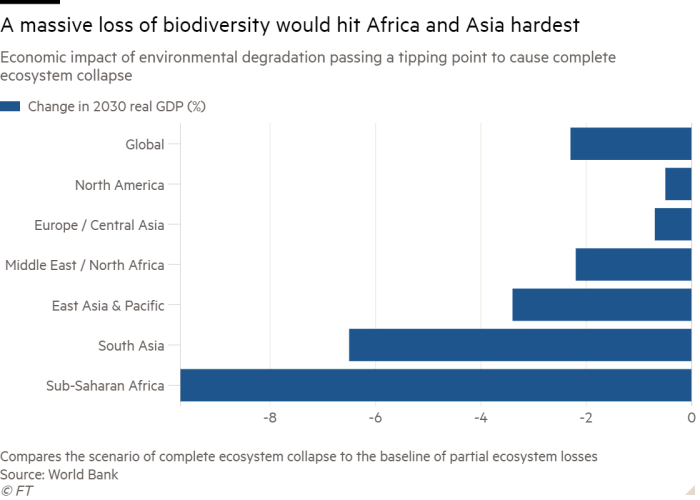A top European Central Bank executive has hit back at accusations of mission creep, arguing that understanding the threats from biodiversity loss was critical for the economy and “not some kind of flower power” exercise.
In an interview to mark its first major investigation into the economic and financial risks stemming from the degradation of the natural environment, Frank Elderson, an ECB executive board member, told the Financial Times that 72 per cent of eurozone companies and three-quarters of bank loans in the region are exposed to loss of biodiversity.
“Destroy nature and you destroy the economy,” Elderson said, pushing back against critics who have claimed the ECB’s work on climate and environmental risk is overstepping its mandate and distracts from its main mission to fight runaway inflation.
“This is not some kind of a flower power, tree-hugging exercise . . . this is core economics,” he said. “Even if I couldn’t care less about the planet, even if I couldn’t care less about biodiversity, I would say the exact same things.”

The ECB studied data on 4.2mn companies in the 20-country single currency bloc to assess how many rely on at least one “nature-related service” such as pollination, clean water, healthy soil, timber, or sand, Elderson said, adding that 72 per cent was “quite a lot”.
Using an example of the agricultural sector’s dependence on plant pollination by insects, he said: “We see insect populations dwindling and this will negatively affect crop yields.”
“These physical risks affect supply and therefore they could also affect prices,” he added. “And this is where it could get into the realm of monetary policy, of price stability and of inflation.” The central bank found that 75 per cent of eurozone bank loans by number were to companies that are nature-dependent.

The ECB expects to publish its full report in the autumn, but it has already been stepping up pressure on banks to tackle the risks from biodiversity losses. In 2020 it published a guide telling lenders how to change their risk management and disclosure to address climate and environmental risks. Elderson believes the central bank to do more to address green issues.
“The economy relies on the services of nature,” he said. “This is also why we have to dig deeper.”
He said 40 per cent of eurozone banks had not yet properly assessed their exposure to nature-related risks when it reviewed this last year.
However, some lenders had started to earmark capital for environmental threats in their internal risk calculations, Elderson said, stressing that the ECB would use “carrots and sticks” to encourage others to tackle the issue. “The glass is not yet half full,” he added.
Elderson’s remarks underline how central banks around the world are starting to assess the potential economic and financial risks from a degradation of nature, on top of the work they have already been doing to tackle the threats from climate change.
The two issues partially overlap. Deforestation increases the risk of flooding, soil erosion and loss of tourism income, as well as adding to global warming. But Elderson said some areas of biodiversity loss were unrelated to climate change, such as flooding risk from a reduction of mangrove forests.
Similar assessments to the ECB’s have been carried out in France, the Netherlands, Brazil, Malaysia and Singapore. The Bank of England is examining potential financial risks from nature loss, working towards a report due out around the end of this year, after it found 72 per cent of UK loans were to companies reliant on “ecosystem services”.
However, former Bank of England governor Mervyn King has said central banks are risking their independence by “moving into the political arena” with their work on climate and environmental risks, while US Federal Reserve chair Jay Powell has promised to “stick to our knitting” and not become a “climate policymaker”.
The Fed launched its first assessment of how climate-related events could impact the country’s six biggest banks in January.
The ECB is also examining how changes to government policy, consumer preferences and investor behaviour in response to environmental damage could impact the most polluting companies, the banks that finance them and the wider economy.
Elderson gave the example of governments trying to tackle the loss of insect populations by banning some pesticides. “That is a transition risk. If you are the pesticide manufacturer, maybe your product is going to be phased out or prohibited.”
The ECB found a higher reliance on nature-related services than earlier studies by the French and Dutch central banks, which looked at a more limited national sample of companies that have issued debt or equity securities.
France’s central bank said in 2021 that 42 per cent of securities held by French financial institutions were issued by companies that were highly or very highly dependent on an “ecosystem service”. The Dutch study a year earlier found the equivalent figure for its institutions was 36 per cent.
The eurozone average is pushed up by higher exposures in countries such as Germany, Italy and Austria. The ECB also included indirect exposures, such as from a company’s supply chain. Excluding these, the ECB said 61 per cent of eurozone bank loans were to companies directly exposed to an ecosystem service.


